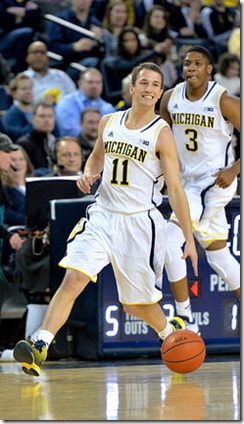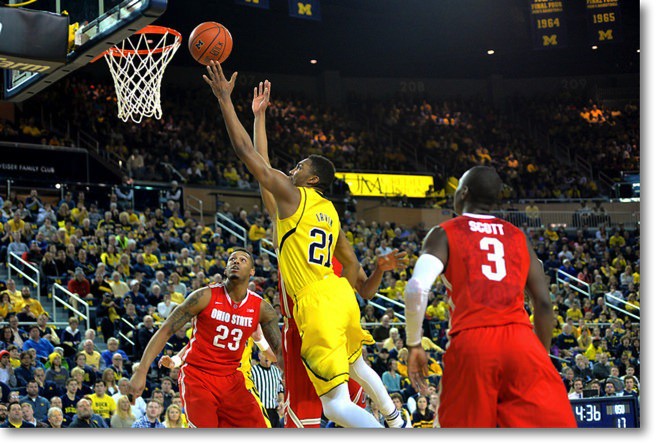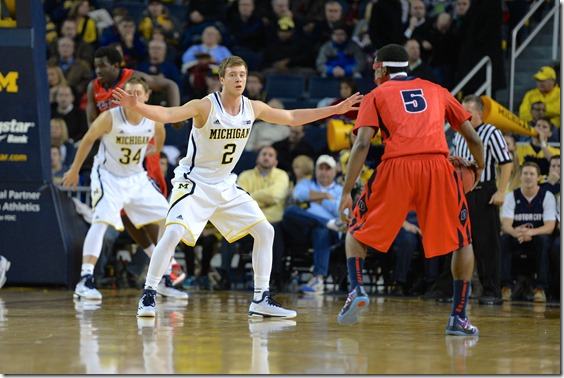2014-15 basketball
Upchurch – MGoBlog
Michigan’s first stroke of bad luck came late in November: the Wolverines had just lost a hard-fought contest to eventual 1-seed Villanova in Brooklyn, but starting point guard Derrick Walton suffered some sort of toe injury – one that would affect him for the remainder of the year, eventually sidelining him for good in late January. It was evident that the injury sapped Walton of his explosiveness, both vertically and running in the open floor, but he played through it until his other foot was injured, most likely due to overcompensation for his original injury.
After a disappointing sophomore campaign, it’s prudent to recall exactly how good Walton was as a freshman. He started all but one game for a team that would come to the brink of a return trip to the Final Four and excelled in a modest role on offense. Derrick got better throughout the season: he posted a gaudy offensive rating (120.8) on a not-insignificant usage rate (18.4) in conference play while posting the fourth-highest free throw rate of qualifying players in the Big Ten; he was arguably Michigan’s best perimeter defender; he shot 41% from three on the season on 105 attempts. Expectations were naturally quite optimistic for the highly-touted Detroit point guard entering his sophomore season.
It’s hard to quantify exactly how much of Walton’s struggles were due to his injury, the stark decline in talent around him, or the burden of an increased role on offense, but the drop-off was so severe that the injury is the best explanation. After shooting an impressive 59% at the rim as a freshman, he shot 41% inside the restricted area as a sophomore – evidence that his toe was clearly bothering him. Derrick was still called on to play just shy of 40 minutes a game (barring auto-bench foul trouble in the first half) and, even though Spike Albrecht played well down the stretch, Walton was clearly Michigan’s first option at the point guard spot before his season-ending injury.
* * *
[After the jump: let's go back to the beginning]
In defense of 2015 [Fuller]
The Question
Ace: There's no question this basketball season was a strange one. Michigan headed in with many question marks but high expectations, started off the season with a couple quality wins and a very competitive game against one-seed Villanova, went on to lose head-scratchers against NJIT and EMU before getting run off the court by Arizona, lost their two best players to injury, and then saw flashes of great promise from several players that didn't necessarily show up in the team's final record.
Let's try to make some sense of this. What about this season would you consider a success, what was a failure, and how did it affect your expectations for the program moving forward?
------------------------------------
Failures
Adam Schnepp: I've placed my hands on the keyboard and taken them off three times before I typed this, but not making the NCAA tournament is a failure. I'm hesitant because of the stark negative connotation of the word "failure."
 |
| Anything that leads to more Dakich isn't so much "failure" as "awesomesauce with an oh darn." [Fuller] |
This is a failure that happened because of course it did. As the hockey guy I'm used to watching the type of failure where you have a team loaded with talent that underperforms and shoots itself in the foot until there's nothing left. Nothing. Not even, like, a bloody remnant that doctors could reconstruct. Just, poof, gone. This is a completely different kind of failure, a failure in which there are explanations (NBA attrition, injuries that led to a lineup Tom Izzo would find weird) that make sense and extend beyond "this is just what we do now."
------------------------------------
Dave Nasternak: Michigan Basketball isn't in the same place that it was seven years ago (one huge mess, but with John Beilein). Its not even in the same place that it was 3 years ago (bummed about a tournament upset but only a round or two away from its ceiling). After seeing the faces of the players and coaches in that hotel in Atlanta two Aprils ago, this program expects to succeed at the highest level. National Championships, Final Fours, Sweet Sixteens, NCAA Tournament games, Big Ten Championships (regular season and tournament) are all accomplishments that this program expects to be competing for every year.
And that's the right answer. As Michigan players/staff/alumni/fans/constituents... that's why we are connected with this University. Now, we don't consistently get the freshmen that Kentucky and Duke get every year, so some of these goals will be a little too lofty from time to time. But I am willing to bet that if you asked people in and around the program if they were supremely disappointed with not obtaining some (most, all) of these goals, they would not only verbally say that they were, but that you would also be able to see it on their faces. That's just what the Michigan Basketball program has achieved.
[after the jump: no more dancing. Around the question I mean. Lots of the other dancing (not That dancing)]

Michigan did not make the 32-team field of the NIT, which was revealed in somewhat excruciating fashion over the last half-hour on ESPNU. John Beilein has already ruled out an appearance in the CBI or CIT tournaments, so this marks the end of the 2014-15 season. It will not be missed too much.


1